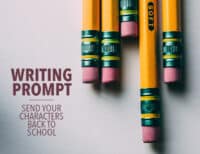Do you write a blog? Mentor other writers? Parent a tiny version of yourself?
Then you’re a coach!

While you may not work in a classroom or on the field, odds are you practice some form of teaching and coaching that impacts the lives of others. You might even be doing that right here at The Write Practice—if you're in a writing group giving feedback and sharing your critique with other writers, you're a writing coach.
And since you're a writer, you might blog about it, consider blogging about it, or write books and other content designed to help people.
Being a know-it-all, I’ve always assumed I was a good teacher and coach. I’ve often taken that attitude into blog posts and book chapters, and then wondered why I received negative comments and feedback.
I’m learning a tough lesson about successful teaching and coaching: Tone is everything.
Because if we coach with the wrong tone in writing, we might not be coaching at all, but driving our readers away!
Don’t Be Mean, David!
Last year, I wrote a book for my subscribers called The 10 Reasons Quit Your Book.
The idea behind the book was to hit writers where it hurts: the lack of response to their work.
As a writer and teacher of creative writing for over ten years now, I have a pretty good idea why some stories work and other stories do not. I’m not perfect by any stretch, but I’ve failed enough times (and seen others fail) to know what makes a reader think, “Meh.”
I shared 10 Reasons Readers Quit Your Book with a fellow writer and judge of last year’s Winter Writing Contest. She enjoyed it and found its teaching useful, but shared a critique that really struck me.
“Your tone,” she wrote, “is rather negative, and this might deter readers.”
In other words, my tone in writing was mean.
And it would almost certainly turn readers off to my message, and to me.
Tone in Writing: The Coach’s Dilemma
I’ve found this to be a challenge with all kinds of “coaching.” How do we identify failure in our readers while encouraging their success?
It’s a tough balance. Most of our readers are probably failing at something that we are not (we may be struggling, but not nearly as much as our readers are).
But your success is the reason you’re writing the coaching post!
- You’ve lost weight, but your reader is still struggling with diet/exercise.
- You’ve made a million dollars, but your reader is still living check-to-check.
- You’ve mastered story structure, but your reader doesn’t know why structure is so important.
See how this gap between master and student can lead to an alienating tone?
This is especially hard because online coaching isn’t relational. We often don’t know our readers personally. Instead, they’re often busy browsers with five minutes to absorb our words of wisdom. If every one of those words isn’t carefully designed to empower them on to victory, we will almost certainly alienate them, probably through a “negative” tone.
So how do we adopt a tone in writing that won’t alienate our readers? What tangible step can we take to achieve this?
The answer — and how simple it is — will amaze you.
3 Steps to Employ the Power of “You”
The secret to mastering a “welcoming” and “positive” tone is in our careful use of pronouns.
In education, teachers use “gradual release” to help students master a new subject. In short, it works like this:
- I do (model)
- We do (guided practice)
- You do (independent practice)
In our coaching, we need to use the same structure, but with a few twists.
1. Start with first-person singular
First, always begin your coaching with first-person examples, using “I,” “me,” and “my.”
This is especially true when giving non-examples, or examples of failure.
One thing I did right with 10 Reasons was begin with an example of my own glaring failure. Then, throughout the book, I referred back to it as a reminder that I am far from perfect and have failed at the concepts before.
This is a great way to build trust with your reader before launching into the concept you wish to coach.
2. Teach the concept in first-person plural
Then, teach the content or concept using the first-person plural: “we” and “us.”
Put yourself alongside the student. Be with them and let them see themselves as on the winning team while learning.
There is a huge difference between a learner who is “below” and a learner who is “with.”
When a student is allowed to see the teacher fail, recover, and pass on this hard-earned knowledge, it makes a world of difference. That is why it’s wise to lead from a humble position, seasoning our role as Coach with the reality of our Humanity.
Then, and only then, can you deploy the trickiest of pronouns: “You.”
3. Use “you” positively
Be positive and patient with “you”
“You” is a powerful word. Unlike “we,” which subtly brings the reader into our midst, “you” keeps the reader separate and alone. It is the most dangerous pronoun, and we are wise to treat it with great care.
Unfortunately for me in 10 Reasons, I wasn’t so careful.
“Non-examples” are often fun stories to tell. They are examples of failure — easy to laugh at, difficult to empathize with. And in 10 Reasons, I often used the pronoun “you” in those non-examples!
In even the most vanilla of moments, associating “you” — who is our precious reader — with anything negative can have a powerful and discouraging impact.
And my tone in writing came off as negative, as a result. While my fellow judge pressed on through the book, I can’t count on a stranger to do the same.
So in my revision of 10 Reasons, I’m choosing to wait until the time is right before unleashing this tricky pronoun.
At the end of each chapter, I reveal the “Story Secret” that leads to success.
Only here, once the bad examples and negativity have passed, do I use “you.”
Your readers want to get better. They want to win.
And they've come to you not just for content, but hope. Give it to them by casting them as the hero once you've finished the harsher points of teaching.
Trust me: This works! I’m about three chapters into my rewrite of 10 Reasons, and I’m noticing incredible differences in the overall flow and feel of the book.
Wait until the end, and wait until “you” can be positive.
We have to be patient with “you,” and only use it once the time is right. Otherwise its coaching power will turn negative and scare our valuable readers away.
Don’t Be Cynical
One final thought on tone must be mentioned, and it has to do with negative humor.
When giving non-examples, it’s often fun to use clever imagery and go for the laugh. Yet in coaching, readers aren’t reading our work for the humor (unless you’re Jon Acuff); they’re reading because they’re hurt, they’re failing, they’re struggling, they’re vulnerable — they’re any number of things that make them a little uneasy.
Put simply, they’re fragile.
So take a lighter approach to humor, especially when incorporating humor into non-examples; we might end up making fun of our readers’ failures without knowing it!
I’m also guilty of writing with a “tough love” tone, using bold words and blunt syntax, thinking of myself as a hard-talking football coach.
Yet most of my readers (creative writers) don’t want a football coach — they want a monk with publishing credentials!
Therefore, despite our zeal for great storytelling, we need to lead our readers with the gentle hand of a mentor, not the sour yell of a frustrated coach.
What Do “You” Think?
So as this post on coaching comes to a close, let me ask you: What do you think? Are pronouns, especially “you,” really so powerful?
You may have already noticed, but I largely refrained from using the word “you” until now.
Up until this point, I’ve extensively given personal examples of failure and recovery. I’ve also delivered my core principles — primarily about pronouns and tone words — in the first-person plural.
“We” are mastering this together. This will help “us” reach “our” readers better.
Probably the most important thing a coach can realize is that learning never stops. I will always be a learner. The moment I finish writing this post, I will go back to my role as a learner, reading other great posts at The Write Practice.
It’s also wise to remember that our readers can offer us more than we think. I’ve often found something in the comments of my posts that challenges what I’ve written, or asks a question and exposes a flaw in the way I taught a concept. This is a good thing, a beautiful thing, for a coach to receive.
Humility is perhaps the powerful quality of a great coach, whether they're a writing coach or a coach of any other kind. A great coach realizes that it is through failure that he or she learns, and humbly passes that on to his/her community. Great coaches are great teammates and learners, and don’t consider their wisdom something to be lorded over others.
So what do you think? Do you want to be a great coach and impact many lives around you?
I know I do. And I’m confident you do, too.
Have you ever had a coach, or coached someone in something you're good at? How did they or you adopt a helpful tone? Let us know in the comments.
PRACTICE
Take ten minutes to write a short story about a failure you’ve experienced in writing.
Then, in the last five minutes, quickly teach a short “lesson” in the first-person plural (“we,” “us,” “our”) to help the community learn with you from this failure.
When you're done, share your writing in the comments. Be sure to leave feedback for your fellow writers and let them know how their tone in writing affected you!







i am in the Blog and i will be coach anytime or when i Start i need some people name too pleases contact me
My dream work mentor said “You” is accusative, “I” is confessional.
I really like that. Easy to remember and oh so true!
This sums up the post perfectly!
Thank you for the tips!
Really informative help. I haven’t yet reached the point to comment on any completed work, but I will undertake the exercise.
I’m fed up of people ringing my doorbell, answering the phone to strangers or having tradesmen call and tell me of the serious maintenance issues I need to deal with right now. The worst mistake I ever made was to pay a chap to “prune” a plum tree – an old one, but a prolific fruiter. He has left me with a skeleton tree, so no more plums!! I’m mad about it.
So, I believe there are a number of ways we can deal with all these unwanted intrusions into our daily lives. We can return the unsolicited mail to the sender – preferably without the necessary postage stamp – or simply bin it, because your chances of winning the prize on offer are probably nil. We can put the phone down if it’s a rubbish call – often from overseas. And we can decline the repairs on offer on the doorstep.
Some tips that will help you, include include checking from a window or peephole to see who is ringing the doorbell before you answer. If you don’t know the person, simply don’t go to the door. If you do answer the door to someone you are not expecting or don’t know, your hand held up and a polite request simply saying “Idon’t know you, please go away” followed by the door being closed and locked will often work for you. With the phonecalls, you can simply put the phone down and say nothing. If you don’t know who is phoning you, it is wise never even to answer using your name. A simple “hello” follwed by their response will allow you to decide on your next action. I hope you have found these hard earned snippets from my own experiences to be of use to you in the future..
You’re welcome! This is definitely a skill that takes a lifetime to develop. Go forth and serve your tribe!
Wonderful, wonderful blog.
We strive to be the best that we can be. What writer begins a writing career with the goal of being a bad writer or failing? Writers and most people in general are already flogging themselves for the mistakes they make. Unfortunately, the more our attention fixates on mistakes, the more they pour out of us like a leaky faucet, or even worse, like a busted pipe.
An uplifting tone makes all the difference. If we can take the “you’re wrong” tone out of the correction and learning curve, and replace it with the hope of “being right and doing better,” then it’s much easier to correct our mistakes and forge ahead. So true that it takes humility to learn and do things well. Kindness and understanding are great teachers.
Thanks so much for your insights about the use of “I,” “we” and “you.” Brilliant. I never noticed that and it’s so true! What great tools. What a great blog!
Thank you, Lyn! I appreciate your thoughtful reflection, too!
This post is just what I needed! I recently landed a job as a content writer at a website where I’m often writing about tough topics. Parenting, for example. How do you advise a parent without accusing them of doing wrong with their child? It’s complicated. I have been thinking a lot about it, wondering what I could do to make my articles lighter and more positive. I guess I have just found the answer. Thank you so much for sharing these tips, David! You’re awesome!
Well said…..nicely written….
Interesting…let’s see how it goes…
One thing I’m rethinking with my web site is the whole question of how a blog presents a writer.
Blogs, by definition, are very casual, informal pieces of writing. They can be written in cyberjargon; they can be mere lists of links or tweets. And authors’ blogs can generate massive publicity for authors. For polymath authors who’ve written several different kinds of books, they can actually get readers to cross over from someone’s scholarly work to his/her comic fiction or vice versa.
The thing I’ve noticed, though, is that the very best authors’ blogs are *not* just written off the top of the writer’s head–although they read that way. Posts are short, often short summaries of things discussed in the author’s book, but the really great ones were planned ahead. If you study blogs like ozarque dot livejournal, you find that the authors admit this.
I posted a lot of top-of-my-head ramblings, with the excuse that, hey, it’s a *blog,* not a *paid professional paper*. Although my blog began with reprints of some paid professional posts and has displayed others, I’ve come to feel that too often the effect of too many hasty writing-practice posts has been to present me as a sloppy writer who doesn’t outline or organize posts. (When paid to do that, I do it.)
I made a decision to try to write fewer, better blog posts, typing them into the computer in advance and releasing them for public view as they were funded.
For some readers who have limited attention spans and goofball senses of humor, the result may be a blog that’s less fun. (Yes, some correspondents whose web sites don’t really have much in common with mine *have* paid me to write posts that meander all over the place in order to make a link to their site fit in naturally.) Weeks now go by when all my web site displays are the Amazon-linked book reviews that are the web site’s official source of whatever income it generates.
For readers who are looking to hire a writer, I think fewer rants and rambles, more coherent and organized posts, are likely to be a better strategy.
We bloggers may know that a blog post, being unpaid, is just a hint at what we’d like to write if we were being paid to write it…but paying customers (and publishers) may forget that and imagine that our blogs represent our very best work. At least they’re justified in thinking that until we’ve published real books, with our names on the covers, that they can buy.
If you’ve published books (under your own name), are your blog posts well organized tie-ins that encourage people to read your books?
If you’ve not yet published books, or only ghostwritten, in-house, or self-published books, how well do your blog posts sell your writing skills to a big-name publisher?